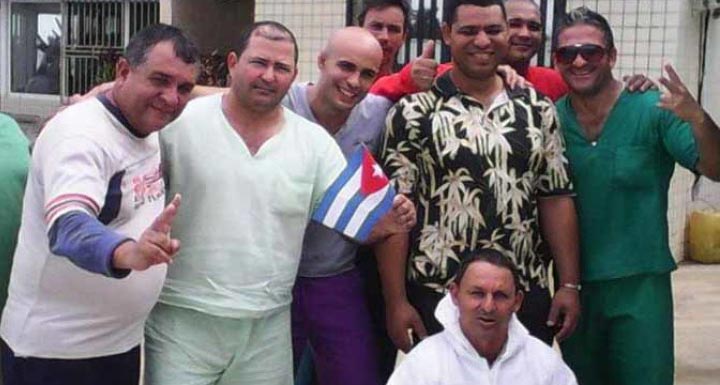
Lost in Miami: Cuba’s role in fighting Ebola
MIAMI – The Wall Street Journal (WSJ) is not a newspaper I usually read. For one thing, the editorial pages of the Journal are the most right-wing of all the national papers. Then there is the fact that since I don’t have any kind of stock portfolio, most of what appears in the pages of the WSJ is irrelevant. Moreover, much of the paper is written in a language that is understood by financial wheeler-dealers but not by most people, including me. Did I forget to mention the fact that the Journal’s culture and lifestyle supplement is titled Mansion? Finally, the WSJ requires a paid subscription to access most articles, a fact that matters nothing to its very well-heeled readers. But would I ever pay a cent to support such a publication? No.
So it was by happenstance that an October 9 copy of the Wall Street Journal was dropped on my lap. I was ready to consign it to the recycle bin when I read this headline on the front page: “Cuban Doctors at the Forefront of Ebola Battle in Africa: Island Nation Outpaces Larger Countries in Sending Medical Staff; Unlikely Partner for U.S.”
To say I was stunned, shocked, and surprised would all be understatements. We live in a city where the media reports on Cuba with a vengeance. Every detail of the life and doings of any dissident hunger striker, any confrontation by Cuban crowds and/or security agents with such anti-government groups as the Ladies in White, are described to the last bruise. Independent bloggers harassed by the state are covered extensively. More than a decade ago, even a wild fabrication concocted by a Cuban nursing school dropout who claimed she was a neurosurgeon and had treated a gravely ill Fidel Castro, a story in which virtually every assertion was false, made it to the front page of El Nuevo Herald.
How, amid such pervasive media attention, did I miss such a huge story as that of the outsized role of Cuban doctors in confronting the Ebola tragedy in West Africa? The answer, as I found out when I searched the Miami Herald’s web page, is that I didn’t miss it. It was never reported. In the midst of all the press frenzy about Ebola, a story that was published in the conservative paper of record was apparently too hot for Miami.
It’s hard to believe that the serious Herald journalists who cover Cuba or the obsessive Cuba bashers like Andres Oppenheimer could have missed this story for ten days. This appears to be no accident and more like an editorial and corporate policy decision.
Here is a short excerpt of what the WSJ reported:
“With risks growing that Ebola could flare on foreign shores, the U.S. is calling for nations to dispatch doctors and nurses to West Africa, where thousands of lives are on the line. Few have heeded the call, but one country has responded in strength: Cuba.”
The WSJ article points out that Cuba, “a tiny island nation of 11 million people,” has sent 165 health workers to Sierra Leone. Sierra Leone is one of the countries hit hardest hit by Ebola. It is also one of the poorest countries in the world, ill-equipped to deal with such a disaster. According to the WSJ, Cuba’s 165 health care workers in Sierra Leone is the largest medical brigade sent to West Africa by any country in the world.
As anybody who has been following my writing knows, I am neither a Cuba basher nor one who extols the virtues of the Cuban system. I have disagreements on a number of levels with the status quo in my native country. In fact, I challenge anyone to come up with a single piece among my extensive writing that sings the praises of the Cuban model.
In this present case, my experience of a decade as a special op/ed contributor first for El Nuevo and then for the Herald makes this particular journalistic crime of omission easier to understand. As former publisher of the Miami Herald, David Lawrence waged the last battle to prevent the paper from adopting the Manichean, white versus black view of the Cuban situation that is part and parcel of the dominant exile ideology. It got him credible death threats and a vicious campaign against the paper.
After Lawrence, the Herald simply capitulated. Giving the [certain] Cubans what they want to hear and, especially, not telling them what they hate to hear, makes life, the selling of newspapers and, most crucial of all, attracting advertisers, easier.
The civil war that led to Batista’s downfall and the victory of the Cuban revolution never really ended. It has been carried out mostly from this country for more than five decades. In the beginning, the Cubans were essentially tools of U.S. interests, easily discarded and left to be routed on the beaches of the Bay of Pigs.
If the Manichean exile ideology held water and Fidel was a bloodthirsty madman like Idi Amin, Castro could have easily massacred every member of the 2506 brigade. Instead, they were captured and eventually traded for medical supplies. The vast majority made it back to Miami safe and sound.
But a funny thing happened in subsequent decades. The exile ideology successfully inserted itself in the DNA of American institutions, beginning with Congress but also including universities, newspapers, and other key sectors. Thus the civil war continues by other means. And, as every journalist knows, in any war the truth is the first casualty.

